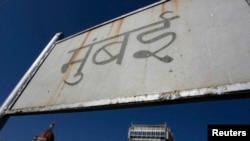The contentious language issue, of whether to use Hindi or English, has resurfaced in India, where the new government is proposing giving Hindi primacy in official communications. India’s southern states, which do not speak the language of the north, have rejected such moves, but the bureaucracy in the Indian capital is scrambling to brush up its Hindi skills.
Whether speaking in parliament, with Indian officials or foreign leaders, Prime Minister Narendra Modi has communicated in Hindi since taking office five weeks ago.
Independent political analyst Neerja Chowdhury points out that the Indian leader, the son of a poor tea seller, is far more adept in Hindi than in English - the two languages recognized as the official medium for federal government communication.
“We have got used to our leaders, many of whom have been Western-educated, speaking in English. But Mr. Modi, he is representing a different India. He has also come through the ranks, you know, his humble beginnings and he has made his way up. So this is the language of comfort for him in so far as expression goes,” said Chowdhury.
Although no one is questioning the prime minister’s personal choice of language, there is resistance to his government’s plan to nudge English aside in favor of Hindi in the corridors of power.
Political leaders in southern states voiced loud protests when his government recently ordered officials to prioritize Hindi over English on official accounts on social media platforms such as Twitter and on government websites.
The government quickly clarified that the diktat was meant only for northern states.
Hindi is widely spoken in the north, where the ruling Bharatiya Janata Party has won most seats. But southern and eastern states have always opted for local languages or English. Five decades ago, efforts to impose Hindi as the country’s only official language triggered violent riots in the south.
And so Prime Minister Modi, a pragmatic leader, who wants to build his party in southern states, gave a subtle message that he is not only familiar with English, but has no aversion to it.
After witnessing the launch of a satellite in the southern Andhra Pradesh state, he surprised many by making his first speech since becoming Prime Minister in English. It was clearly an effort, but an astute move to reassure the south, from where many of the scientists hail.
Although the south may be sticking with the language bequeathed by India’s British rulers, officials in New Delhi continue to be under pressure to opt for Hindi. And many are clearly unhappy.
India’s upper middle class, which includes many senior bureaucrats, largely has grown up speaking English in their homes. Most have studied in schools that use English for instruction, and some have gone to Western universities. Although they still speak Hindi, their written communication skills are often labored. And in an effort to cope with the language now in favor, many bureaucrats are scrambling to deepen their knowledge of Hindi, particularly words used in official communication.
Subhash Kashyap, a former official in parliament, said the colonial model, based in English, is a long-running habit with the bureaucracy. He said there should be no resentment if Hindi - the language that is more widely understood by the masses - is promoted, but it should not be pushed.
“The bureaucracy, simply because they have been used to certain things, that should not be an argument against it. But it should be a slow, natural process. It should take its own time, there should be no feeling of being compelled, or no feeling of any language being forced,” said Kashyap.
Critics agree that the government should not favor one language over the other in a country that has benefitted from its knowledge of English. It links a diverse country with 22 official languages, and many dialects, and serves as the language of commerce.
The English language skills of Indian engineers gave momentum to the growth of the country’s famous information technology industry. Most Indians from low-income groups are opting to send their children to English medium schools to give them an edge in the job market.
Chowdhury said that in a globalizing world, India’s familiarity with English is a huge benefit.
“The world is moving on, look at the way the Chinese are learning English. And why should we give up a natural advantage that we have had all these years?” asked Chowdhury.
The push to end the primacy of English in official corridors is partly seen as an effort to break away from the traditions set by the erstwhile Congress Party, which dominated India since independence and whose top echelons are drawn from the elite.
Prime Minister Modi and the BJP want to reinforce their credentials as a Hindu nationalist party that will represent the swelling ranks of those joining the middle class, who may not be as conversant with English.








